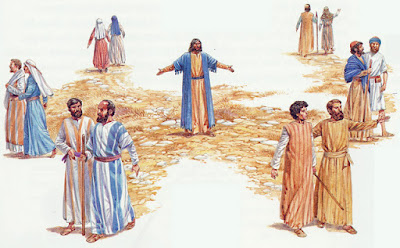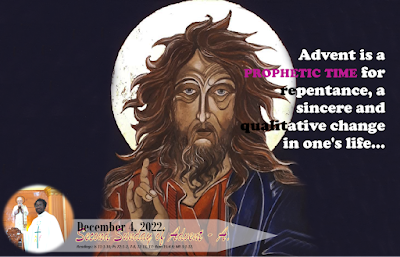All sent to be missionaries of peace.
July 7 2019: Fourteenth Sunday in Ordinary Time
An Afghan proverb says, “Though God is almighty, he doesn't
send rain from a clear sky.” Mission will always be accompanied with hardships,
but at the end, it opens to rejoicing.
Talking of calling, we stated last Sunday that for many, it
refers to specific calls, the call for priesthood and religious life, and
therefore, some people feels not being concerned. Though we tried, through the
readings of last Sunday to make it clear that all were called, there still are
some abstracts in the definition and the content of the call.
Today’s Gospel makes it the clearer. If some have the
singular and specific call, priesthood and consecrated life, nevertheless, all
are called. The mission of bringing the kingdom of God throughout the world is
not the prerogative solo of the religious and consecrated people and the
priests. We all are urged to become instruments of God’s kingdom.
It does not ask to be a priest, a bishop or a religious in
order to become a peacemaker. That is a task that imparts to all, and mostly to
us, followers of Christ. Thus, the words of Jesus in today’s Gospel, “The
harvest is abundant but the laborers are few; so, ask the master of the harvest
to send out laborers for his harvest.”
Our world today, our societies are dearly in need of peace. We
need not Jesus to remind us that fact. One only need to open his eyes and his
heart and feel the cries of people. Injustice is growing at an exponential degree;
politicians are leading the world to the most questionable future. Insecurity, famine, extra-judicial killing and what more… And this cannot be only the task of priests
and consecrated people to cry out those sad happenings. We all have a part to play.
Thus, the request of Jesus, “So, ask the master of the harvest to send out
laborers for his harvest.”
And then, saying this, we read that, in the great number of his
followers, Jesus choose seventy-two and made of them missionaries of peace. One
mention of St. Luke tells us that, actually it is all, and not the small group
of the apostles. We read that “the Lord appointed seventy-two others whom he
sent ahead of him in pairs to every town and place he intended to visit.” The
expression ‘Other’ has all its meaning to express the universality and the openness
of that mission to all.
Then coming to the content and the modality of the mission,
the Gospel but also the two other reading will meet on many points. We read
that firstly, the mission is that of God himself and the mission entrusted to
Jesus. We are made co-workers or partners of Jesus in his mission. Two expressions
mainly prove it, “ask the master of the harvest to send out laborers for his
harvest.” The master of the mission are not the missionaries, but God. And
secondly, we read, “the Lord appointed seventy-two others whom he sent ahead of
him in pairs to every town and place he intended to visit.” The seventy-two
were just ambassadors, people sent ahead of Jesus. He intends himself to visit
those places and bring about God’s kingdom. But before going there, he gives
mandate to some to go before him.
After these first clarification, Jesus defines the rules and
gives the roadmap. These are what we could call the vademecum or the ten
commandments of the missionary. It is as a kind of handbook or guide that the
missionary must keep constantly at hand for consultation. The first guide, a
reminder on the fact that the mission won’t be an easy task. The missionary
will face crosses, oppositions, rejections and many other hardships. “Behold, I
am sending you like lambs among wolves.” Paul, we read in the second reading
experienced that fact. Crosses, he said, have always been part of his
apostolate, till the point, they will become for him the resource of all pride.
“May I never boast except in the cross of our Lord Jesus Christ, through which
the world has been crucified to me, and I to the world.” By being so accustomed
to trials and crosses, Paul ends by seeing in them the real glory.
Then another guide, “Carry no money bag, no sack, no
sandals; and greet no one along the way.” Here is a call for every missionary
and artisan of God’s kingdom to travel fast and light, to avoid all encumbrances
or any thing which at the end, could be hindrance to the success of the mission.
Few weeks ago, I was transferring to my new community, my
new assignment. Upon arriving, the confrere who welcomed me puts a substile
question, “How many are your sins?” To say, how many things are you carrying?
And it is a fact, as missionary of God’s kingdom, we are urge to travel light.
Another guide, “Into whatever house you enter, first say, 'Peace
to this household.'” That is actually the first content of the mission. We are
sent to be instruments of peace. And that must start from our greetings and
words. Then, will follow the others instructions and directive for the success
of the mission.
At the end, we read that the fulfillment of the mission
results always in great joy. The message of the first reading: “Rejoice with
Jerusalem and be glad because of her, all you who love her; exult, exult with
her, all you who were mourning over her!” Though in the carrying of our mission
of peace we will face adversities and trials, all these will end in great
rejoicing and songs of happiness. We read that, at their return, the seventy-two
were “rejoicing, and said, ‘Lord, even the demons are subject to us because of
your name.’”
God who calls and sends for the mission will always bring it
to fulfillment and success and this will be for the rejoicing of the missionaries.
What is asked of us is our availability and disposition to let the Lord make
use of us for his mission. And Jesus direct even the joy of the missionaries to
greater joy. “Nevertheless, do not rejoice because the spirits are subject to
you, but rejoice because your names are written in heaven.”
Coming back to us, we are all called and
appointed to be instruments of peace. It will always cost as a lot and even the
greatest sacrifice and crosses. The world, we know, has never been kind with
peacemakers and activists of justice and human right. The examples are plenty:
Martin Luther King, Rosa Parks, Mohandas Gandhi, Mother Teresa, John Paul II,
Patrice Lumumba, Nelson Mandela and many more. Nonetheless, peace will always
prevail and justice and truth too. “The harvest is abundant but the laborers
are few…” Let us make it our task to bring the kingdom of God, kingdom of peace,
love, joy and happiness to be a reality, starting in our families, schools,
offices, communities and our societies. Let us not forget, though it is challenging
and difficult to be peacemaker, and it is rewarding.




Comments
Post a Comment